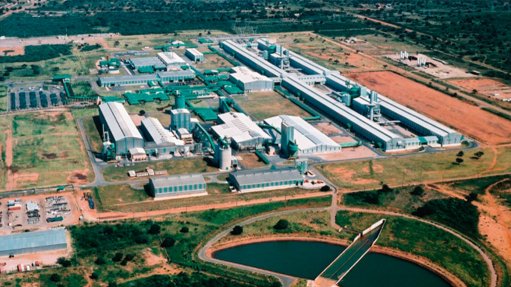Awsisa calls for urgent action, decisive leadership on Water Indaba resolutions
Decisive leadership and swift, boots-on-the-ground implementation – along with “quick wins” – are essential to ensure the success of the resolutions of the Water and Sanitation Indaba, held last week, the Association of Water and Sanitation Institutions of South Africa (Awsisa) said on Monday.
The Water and Sanitation Indaba was held in Midrand from March 27 to 28 to unpack steps to transform South Africa’s water sector.
Key resolutions spanned service delivery, investment, technical capacity, governance and corruption challenges to ensure the sustainability and inclusivity of water services across the country.
Bold, decisive leadership at every level of government and collaborative action by national government, local authorities, the private sector and communities are paramount in addressing the escalating water crisis, and to translate these resolutions into tangible, sustainable changes, the association said in a statement on Monday.
“The resolutions outlined at the Indaba must be implemented urgently, with transparency, accountability, and consistent progress reporting.”
The association indicated that there were several quick wins that should be prioritised, including ring-fencing water revenues; strengthening water boards; implementing nonrevenue water (NRW) reduction programmes; incentivising water efficiency; addressing infrastructure security; and the immediate roll-out of special purpose vehicles (SPVs).
“Swift action is required to ring-fence water revenues and ensure they are dedicated to maintenance, leak detection and NRW reduction efforts.”
For water boards, capacity assessments must be completed without delay, with actionable plans for increasing their role in retail water services.
There is also a need to ensure municipalities have the necessary tools and skilled personnel such as engineers and artisans, as well as access to technology and infrastructure resources.
“However, there are limited capacity-building programmes for municipalities, particularly in rural and underserved areas. There is a significant need to focus on developing local talent and ensuring sufficient career development opportunities in the water sector.”
Meanwhile, Awsisa, advocating for the immediate implementation of NRW reduction programmes within all water service authorities (WSAs) focusing on replacing aging pipes, repairing leaks and reducing water losses, also highlighted the benefits of the circular economy to manage water.
“The critical importance of adopting the circular economy model for effective water reclamation and demand management cannot be overstated. This approach is essential to ensuring water security and sustainability in the long term.”
There is also a need to develop incentives for the agriculture sector and industrial users to adopt efficient water-saving technologies, particularly in irrigation.
In terms of infrastructure security, asset protection plans should be implemented immediately, focusing on community education and engagement to combat theft and vandalism.
“Criminality, theft and vandalism of water infrastructure continue to undermine the efficacy of water service delivery. Awsisa strongly endorses the development of an infrastructure security strategy and supports collaboration with the Special Investigating Unit to combat corruption and water theft,” the association commented.
In the short term, Awsisa called for the immediate establishment of community-driven initiatives to protect water infrastructure, including forming water committees in vulnerable areas and the strategic deployment of resources to safeguard infrastructure, drawing lessons from successful community engagement models in Cape Town and Nelson Mandela Bay.
However, there remain insufficient enforcement mechanisms to prevent corruption, theft and vandalism. Clear legal frameworks and enforcement protocols must be developed to strengthen protection of water infrastructure.
Another quick win for the sector will be the immediate roll-out of SPVs in municipalities with the greatest need to improve operational efficiency and service delivery, while maintaining municipal ownership.
The association said it also fully supported the resolution to foster collaboration with businesses and civil society to promote water-sensitive communities.
“There should be actionable partnerships between municipalities, Awsisa and the private sector to raise awareness about the importance of water conservation and infrastructure protection, as well as immediate public education campaigns that focus on water-saving technologies such as precision irrigation, rainwater harvesting and smart water management.”
Awsisa, noting a need for more cross-sectoral collaboration beyond the water and sanitation sectors, said gaps remained, including a lack of integration between water, sanitation and other sectors such as health, agriculture and urban planning, which was vital for achieving comprehensive and sustainable water management.
“These sectors need to be interconnected to ensure a holistic approach to addressing water security.”
Further, there is no clear national strategy for climate change adaptation and long-term water conservation, which is essential given the growing uncertainty around water availability owing to changing climate patterns.
The association said that the Department of Water and Sanitation (DWS) must be the custodian of the Green Climate Fund, which is currently managed by private entities.
“This fund should be used directly for water reuse initiatives, benefiting water boards, catchment management agencies and municipalities. The department must be sensitive to the country’s transformation policies when activating this fund, both directly and indirectly, to promote equitable access to water resources, technological innovation and the protection of our water ecosystems.
Further, while the association supports the creation of a National Water Resource Infrastructure Agency, its operationalisation and board appointment must be transparent.
The DWS aims to complete the full establishment of the agency by mid-2026.
“Given the sensitivity surrounding the Trans-Caledon Tunnel Authority’s disbandment, the process must follow the due process stipulated in relevant legislation and National Treasury prescriptions.”
Article Enquiry
Email Article
Save Article
Feedback
To advertise email advertising@creamermedia.co.za or click here
Press Office
Announcements
What's On
Subscribe to improve your user experience...
Option 1 (equivalent of R125 a month):
Receive a weekly copy of Creamer Media's Engineering News & Mining Weekly magazine
(print copy for those in South Africa and e-magazine for those outside of South Africa)
Receive daily email newsletters
Access to full search results
Access archive of magazine back copies
Access to Projects in Progress
Access to ONE Research Report of your choice in PDF format
Option 2 (equivalent of R375 a month):
All benefits from Option 1
PLUS
Access to Creamer Media's Research Channel Africa for ALL Research Reports, in PDF format, on various industrial and mining sectors
including Electricity; Water; Energy Transition; Hydrogen; Roads, Rail and Ports; Coal; Gold; Platinum; Battery Metals; etc.
Already a subscriber?
Forgotten your password?
Receive weekly copy of Creamer Media's Engineering News & Mining Weekly magazine (print copy for those in South Africa and e-magazine for those outside of South Africa)
➕
Recieve daily email newsletters
➕
Access to full search results
➕
Access archive of magazine back copies
➕
Access to Projects in Progress
➕
Access to ONE Research Report of your choice in PDF format
RESEARCH CHANNEL AFRICA
R4500 (equivalent of R375 a month)
SUBSCRIBEAll benefits from Option 1
➕
Access to Creamer Media's Research Channel Africa for ALL Research Reports on various industrial and mining sectors, in PDF format, including on:
Electricity
➕
Water
➕
Energy Transition
➕
Hydrogen
➕
Roads, Rail and Ports
➕
Coal
➕
Gold
➕
Platinum
➕
Battery Metals
➕
etc.
Receive all benefits from Option 1 or Option 2 delivered to numerous people at your company
➕
Multiple User names and Passwords for simultaneous log-ins
➕
Intranet integration access to all in your organisation


















